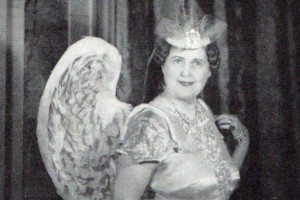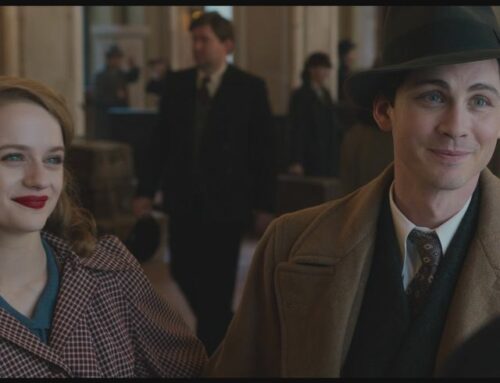Hold onto your hats– and your eardrums– and prepare to laugh yourself silly!! Meryl Streep does it again, this time in a bravura “comedia-tura” performance as a real life “coloratura-challenged” heiress with a passion for grand opera, but no talent: FLORENCE FOSTER JENKINS. Stephen Frears once again turns his attention to a strong female character based on real life (“The Queen” 2006, “Philomena” 2013) and directs this screwball comedy with a tender touch, achieving surprising poignancy while whipping up gales of laughter, and finally, magic.
Streep once again penetrates the heart of this character and astonishes as Florence Foster Jenkins (1868-1944) a wealthy NY socialite whose dreams far exceed her grasp, but whose purity of intention and gentle soul carry the day– and our hearts. She adores opera and routinely holds musicales in her overstuffed penthouse above the city, where dotty dowagers, and music lovers gather to witness her extravagant performances in a variety of musical tableaux.
It’s all there in the opening minutes of the film, the filmmakers intentions and Streep’s balancing act. First we meet Florence mid-air, at a gathering of the Verdi Club which she founded. She makes a grand entrance from on high as the “Angel of Inspiration,” her generous frame (Streep padded out to matronly proportions) suspended and teetering aloft on ropes, winged and wafting over a bedazzled crowd of music lovers. Having feasted on Jenkins’s traditional menu– trays of sandwiches and tubs of potato salad–they now lick their lips in anticipation of the musical spectacle to follow, and Florence’s ample philanthropic contributions.
We don’t hear Florence sing just yet– Nicholas Martin’s script, pitched perfectly between drama and comedy, makes us wait for that indescribable pleasure. No, after this insane entrance, we next see Florence humbly accepting a gift from her adoring audience and declaring with tears in her eyes her deep love of music–and we understand that despite her flamboyance, there isn’t a pretentious bone in her body. She deeply believes in what she’s doing, and sees herself as a muse and a servant of the art of music.
The next scene drives the point home, as we see an exhausted and unadorned Florence sink into bed, drifting off to sleep as her husband/manager St. Clair (who calls her “Bunny”) delicately removes her wig and eyelashes. St. Clair Bayfield, a second-rate Shakespearean actor is deftly played by Hugh Grant with ample reserves of empathy, grace and fancy footwork. This is one of his most endearing performances in years.
Theirs is a marriage of the spirit; while Florence pursues her passion for music, St.Clair openly but discreetly pursues his physical passion for a younger lover Kathleen, a spritely Rebecca Ferguson. The reasons for this arrangement become clear later on and add another layer to our appreciation of Foster Jenkins’s generosity.
Florence decides she is once again going to take up singing lessons and will give a concert in Carnegie Hall to benefit the troops during WWII. (The actual event took place October 25, 1944 and was attended by Cole Porter among other luminaries.) She finds her perfect accompanist in one Cosme McMoon gloriously played by Simon Helberg (“The Big Bang Theory”) as an odd, effete little man with a light touch who joins their happy little world of whimsy, though he has yet to hear her sing. And then, one afternoon he does, and it is one of the most sublimely funny scenes I’ve ever seen or heard.
As the first notes escape Florence’s upturned throat, not merely off pitch but searching wildly for a place to land, somewhere between a demi and a semi-quaver, with”a sub glottal pressure that defies medical science,” McMoon is apoplectic, and doing his best to hold it in. I was ready to burst. As Florence’s arms flap and her eyes dart heavenward, we begin to understand she hasn’t a clue how she sounds, but it’s clear she’s convinced it’s mighty close to perfection.
Eyes popped in disbelief, McMoon is stricken. How can he play Carnegie Hall with her? But he soon joins forces with St. Clair and gets on board to help Florence scale the heights, as they paper the hall with music lovers, and curiosity seekers, while protecting her from the harsh reality (and critics) who’d burst her beautiful little bubble.
Streep as we know, is vocally versatile; witness her broadly Broadway turn in “Into the woods,” her country alto in “A Prairie Home Companion,” Swedish pop and bluesy rock in “Mamma Mia,” and “Ricki and the Flash,” and her haunting a cappella “Amazing Grace” at the end of “Silkwood.” So it might be hard to understand just how difficult it is to sing badly when one sings well. It certainly required that Streep learn some of these supremely difficult arias so as to bend them ever so oddly to Florence’s limitations while maintaining her dignity and innocence. (Click HERE and listen to the real Foster Jenkins decimate Mozart’s “The Magic Flute.”)
Somehow, Streep’s bad singing is absolute perfection. She sounds awful but in a very engaging and charismatic way, and makes us love Florence. She had me at “eeeeeeeeeeyyaahhhhhhhh.” I laughed till I cried. The end of the film sealed the deal, giving us a glimpse of how dear Florence must have sounded to herself; it’s a blessed moment. Jenkins reportedly said near the end of her life, “People may say I can’t sing, but no one can ever say I didn’t sing.” Streep, Frears, and company have mounted a tender and revealing spectacle onstage and off, at Carnegie Hall and behind the scenes, and finally on the imaginary stage on which we each see ourselves. FLORENCE FOSTER JENKINS has oh so sweetly redeemed the fool in all of us, providing safe harbor for dreamers everywhere.







Leave A Comment
You must be logged in to post a comment.